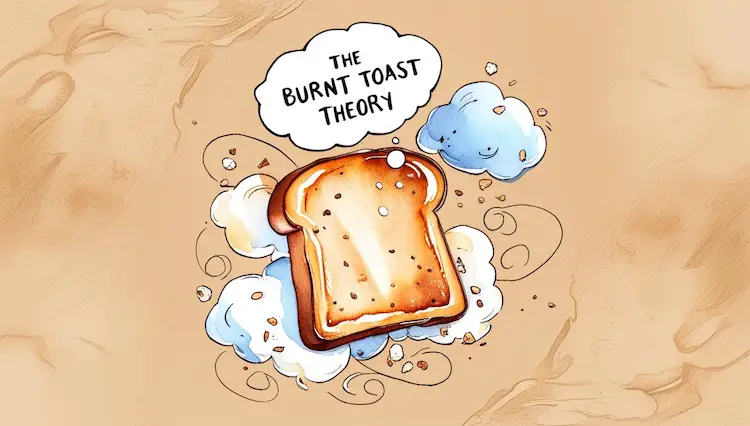
The burnt toast theory suggests that minor frustrations can lead to unexpected positive outcomes, promoting a more optimistic outlook on life. It originates from the idea that small daily annoyances, like burning your breakfast toast, can prevent larger misfortunes or result in beneficial experiences. This theory encourages individuals to reframe their perspective on frustrations, viewing them as potential blessings in disguise. For example, consider someone who burns their toast but, in the process, realizes they need to leave for work earlier, thereby avoiding traffic and arriving on time. Such instances remind us that small setbacks can be integral parts of a larger life narrative, shaping our experiences and reactions.
Embracing the burnt toast theory can significantly enhance one's ability to cope with stress and develop patience. By accepting that every little inconvenience can lead to a positive outcome, we cultivate resilience, allowing us to navigate life's unpredictabilities with grace. For instance, an individual who experiences a delayed flight may find that the extra time allows them to relax, read, or even meet someone new at the airport. Such perspectives transform annoyances into opportunities, fostering a mindset that appreciates life's imperfections.
Coined by psychologist Dr. Alexandra Stratyner, the burnt toast theory emphasizes the importance of accepting imperfections and appreciating life's little moments. The metaphor of burnt toast serves to illustrate how minor setbacks can prevent significant misfortunes, such as accidents or missed opportunities. Imagine someone who misses a bus due to a spilled drink; while it may seem like an inconvenience, it could protect them from a more serious situation, such as being caught in an accident that occurs on the bus they would have taken.
This theory supports the notion that these minor inconveniences can often lead to better outcomes, enhancing our coping mechanisms. The shift in mindset it advocates allows individuals to view failures as stepping stones rather than roadblocks. By recognizing that every negative experience may contribute to personal growth and deeper understanding, we can learn to embrace life's unpredictability with a more positive outlook.
 Lessons from the Burnt Toast Theory
Lessons from the Burnt Toast TheoryThe burnt toast theory emphasizes the significance of maintaining a positive outlook, reminding us that today's mishaps do not dictate future outcomes. Each day offers us a fresh start, and this perspective allows us to approach challenges with renewed energy. For instance, someone who forgets an important meeting may later discover that the extra time allowed them to come up with a better plan, leading to more successful outcomes in the long run.
Furthermore, the theory encourages self-compassion, reassuring individuals that feeling frustrated is a common human experience. By illustrating how small inconveniences can lead to personal growth, the burnt toast theory helps individuals reassess their situations. It highlights the importance of resilience, teaching that setbacks can fortify one's character and resolve. Recognizing the potential hidden benefits of daily annoyances cultivates gratitude and mindfulness, empowering us to look beyond immediate frustrations and see the broader picture.
Personal anecdotes reveal how missed opportunities, like a delayed ferry, can lead to life-saving outcomes. For example, someone who misses a flight due to a trivial issue might later learn that the flight was involved in a serious incident. These real-life applications underscore the protective purpose of seemingly negative experiences and how they can ultimately guide us toward better paths.
The burnt toast theory is often associated with the butterfly effect, where small changes can lead to significant outcomes over time. Stories of individuals who transformed negative experiences into positive life changes exemplify the practical application of the theory. For example, a person who lost their job might discover a newfound passion that leads to a fulfilling career. By applying the burnt toast theory to various aspects of life, including work, relationships, and personal aspirations, individuals can adopt a holistic approach to challenges.
Research links optimism, fostered by the burnt toast theory mindset, to reduced anxiety, increased resilience, and lower mortality rates. Adopting a positive mindset not only improves mental health but can also enhance physical well-being, boost confidence, and facilitate quicker recovery from stress. Engaging in reflective practices, such as journaling about daily frustrations, can help individuals recognize patterns and the potential benefits of minor annoyances.
Techniques to cultivate positivity include deep breathing, maintaining objectivity, and seeking support from friends. By reframing setbacks as opportunities for growth, individuals can improve their decision-making skills and enhance their overall outlook on life. This perspective allows them to weigh the pros and cons of their challenges more effectively, ultimately leading to a more fulfilling existence.
 Embracing the Burnt Toast Theory for Personal Growth
Embracing the Burnt Toast Theory for Personal GrowthAcknowledging that life's inconveniences might serve a greater purpose can foster resilience and adaptability. The burnt toast theory encourages individuals to view challenges as opportunities for growth, enhancing their overall well-being. For instance, those facing adversity in their careers may find that their struggles lead to personal development, better strategies, and ultimately, greater success.
By embracing this mindset, individuals can enhance their coping strategies and foster a more optimistic approach to daily challenges. Cultivating a burnt toast mentality can also lead to improved relationships as individuals become more patient and understanding toward others' frustrations. Ultimately, applying the burnt toast theory empowers us to navigate life's unpredictabilities with grace and positivity, turning minor setbacks into stepping stones for personal growth.